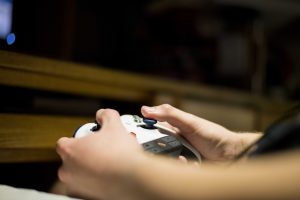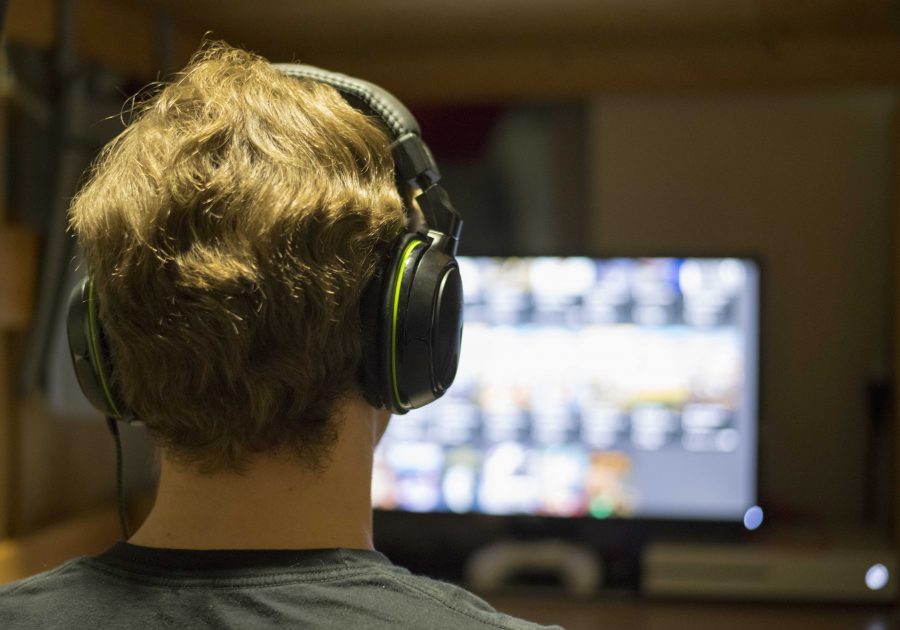When one thinks of sports, usually there are a few things that come to mind — a ball, a field of play, a goal of some sort and team colors. I bet you didn’t think “digital.”
The University of Utah, while boasting a wide array of athletics at both the club and NCAA level, is introducing a new frontier of sports.
Electronic sports, or eSports, is a new and growing community, living and expanding at universities across the country. It might be a new sport, but the idea for competitive video gaming has been around since the video game industry began.

(Photo by Curtis Lin | Daily Utah Chronicle)
The earliest known instance of a for-profit video gaming competition took place at a university. Stanford University hosted a video game tournament in 1972, centered around the game Spacewar. Students around the university were invited to the competition with the prize being a year’s subscription to Rolling Stone. The first company-sponsored event wouldn’t take place until eight years later, when then-juggernaut Atari hosted a tournament based on Space Invaders, where over 10,000 people entered to participate. The first of these tournaments featured on television was Starcade, a television show that aired 133 episodes about gamers trying to best each other’s high scores in various arcade games. The show aired from 1982-1984.
The community surrounding competitive video gaming has a rich history, but the status and classification of these tournaments, teams and players as a sport is a huge point of debate.
It can be said that there is an equal level of training between athletes who play physical sports and eSports athletes who play competitive video games. While obviously using different methods, eSports athletes can spend just as much time in front of a screen as a football player spends on the field. Whereas an athlete will focus on muscle memory, physical fitness, dexterity and execution, a professional eSport athlete would focus on strategy, hand-eye coordination, map layout, equipment uses and many other factors. Of course, these skills are not mutually exclusive to each category of athlete, but there is something to be said about the amount of time that each respective group spends in training. At the highest of professional levels, both sports and eSports players can rely solely on their performance to make a living wage, and there are certainly huge pools of prospects constantly fighting for spots and recognition by professional organizations to join those elevated ranks. The only difference between the two is the activity being done and the skill sets involved in doing those activities.

(Photo by Curtis Lin | Daily Utah Chronicle)
Heading into the 2018 school year, ValueGamers.com, a lead resource for both computer hardware information and eSports news, ranked the U’s eSports team as the No. 2 program in the country, behind Miami University and ahead of UC Irvine.
Craig Casazza, the author of the rankings list, commented on the differences between Utah’s program and other schools around the country.
“Because it’s so young, we examined not only the program, but the atmosphere and resources surrounding the program,” said Casazza. “Program strength, how good the location is, the food, the campus life, the University of Utah excelled at all of those categories.”
Casazza also commented on the opportunities that a strong eSports community can open for a university.
“The industry is rapidly growing. More schools are opening up esports programs and more mainstream outlets will cover them. More scholarship outlets are opening up with these programs.”
When asked about the potential of eSports, Casazza had nothing but high hopes.
“You’ll begin to see ESPN, CBS and ABC cover it in the near future. There is a lot of money to be made in the industry.”
While a very young industry, the U’s eSports community is far and away ahead of the curve of advancing technology. The team currently specializes in four games: League of Legends, Hearthstone, Overwatch and Rocket League. The “varsity” team will compete with other teams around the country and will continue to add personnel and games as the demand rises. The team uses top-of-the-line equipment provided by the university, and many of their players are playing on scholarship, which requires abilities both at the keyboard and in the classroom in order to qualify for the team.
In an ever-evolving world, the U has found yet another way to innovate and lead the pack.


